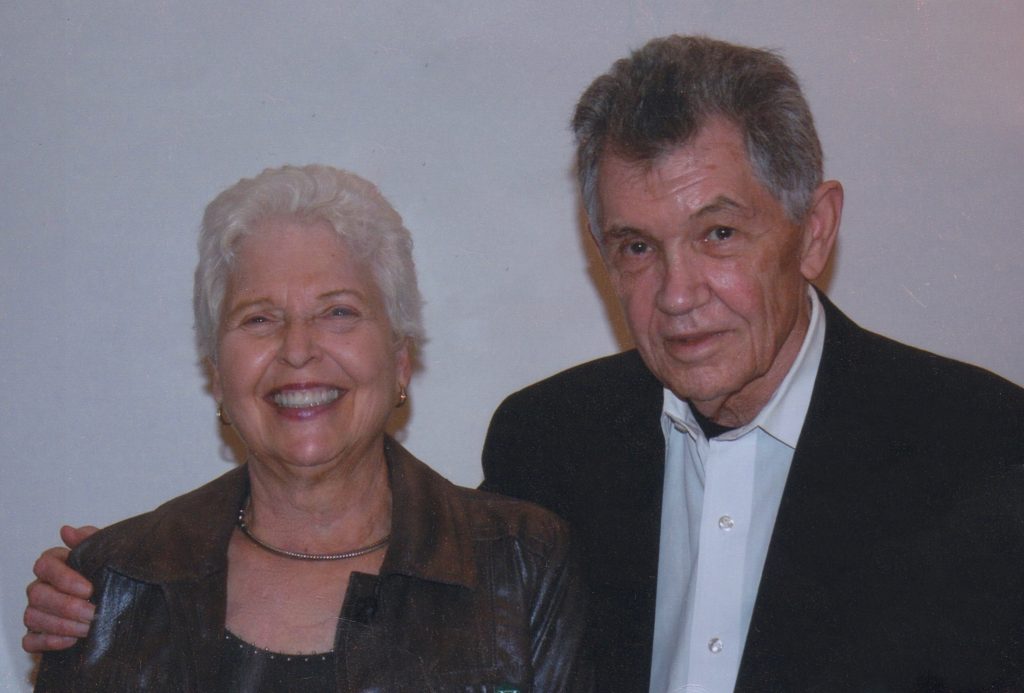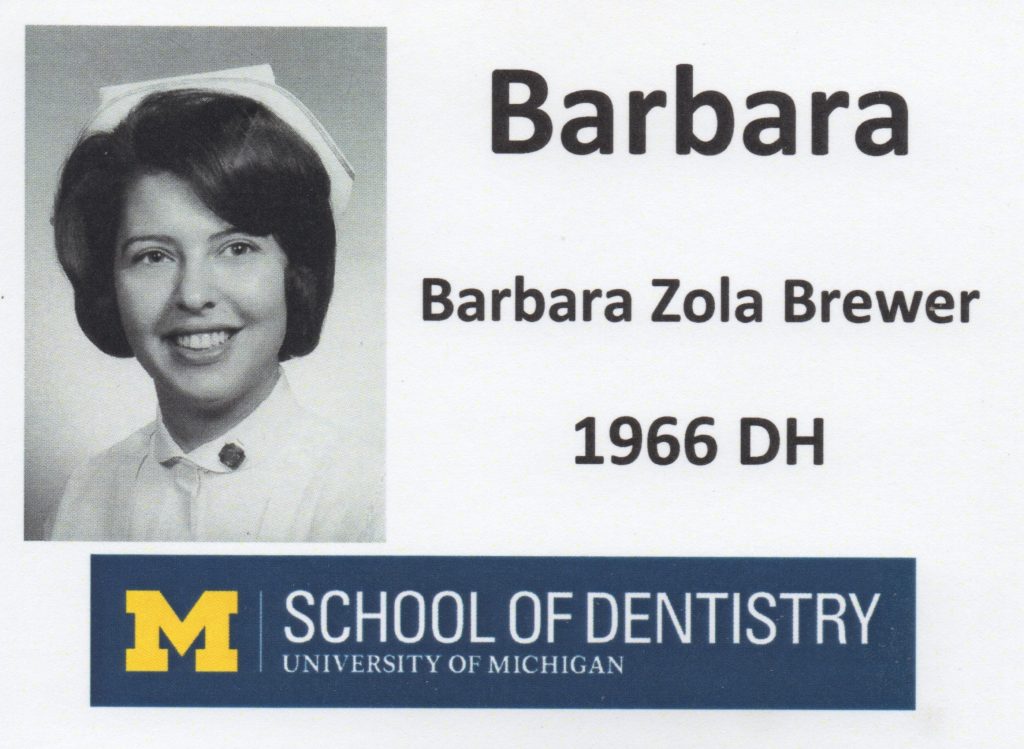Alumni Profile: Barbara Brewer (BSDH 1966) – a hygienist career always on the move9 min read
This is one in an ongoing series of profiles of School of Dentistry alumni, faculty and students.
When Barbara Zola was growing up in Saginaw, Michigan, in the late 1950s and early 1960s, she spent a lot of time at her father’s dentist office. At first it was within walking distance of their home, then later she would go to the public library near his office to do her homework after school before walking the short distance to his office.
Dr. Boris Zola had earned his dental degree in Toronto, Canada, performing magic shows to help pay his way through dental school. In Saginaw he established a successful practice and continued to perform his magic, both publicly and with patients, where he might pull out a sleight-of-hand trick while he and a patient waited for the anesthetic numbing to take effect.
Barbara idolized her father and wanted to follow in his professional footsteps. “When I was about 15 or 16, I told my dad I was going to be a dentist like he was, that’s what I wanted to do,” she recalls. His response was a combination of “know your daughter” advice mixed with the societal norms of the time when dentistry was almost entirely a male profession and hygiene was a female profession. He knew his daughter liked exploring the world and wouldn’t want to be anchored in one place. She remembers his response this way: “Barbara, listen, what I want you to do is go to the Michigan dental school and I want you to be a hygienist. I know that you do not want to stay in one town but you will probably have to if you become a dentist. So from that standpoint, my opinion is that you should be a dental hygienist. That way you can marry somebody someday and take your dental hygiene degree wherever you go and practice dental hygiene wherever you go.’ ”

It made sense to Barbara and it turned out that her father accurately predicted the future. “He called it exactly the way it worked out – it was uncanny,” she says today, more than 50 years later. Two years after earning her dental hygiene bachelor’s degree at the University of Michigan School of Dentistry in 1966, she met and married William Brewer. With engineering and business degrees, he worked his way up through the ranks of General Electric Company in an impressive career that required six family moves over the years.
In most of the places they lived, except for a few years after their two sons were born, Barbara worked for local dentists, sometimes full-time but usually part-time. She counts more than 20 dentists in her journey through Michigan, Pennsylvania, Virginia, West Virginia and her current home state of Texas. She earned a master’s degree in dental hygiene in West Virginia with the idea that she would teach there, but the family move to Texas for her husband’s job interrupted that plan.
Now retired in The Woodlands, Texas, near Houston, Barbara doesn’t view the many moves as detrimental to her career. “I was such an adventurous person that I loved it. I would complain when we first moved. Once I got there, I got involved and didn’t want to leave. I really think I’ve had such a great career because my husband moved us so many times and it worked out really well for me.”
Her lifelong immersion in dental hygiene began under the tutelage of Dr. Dorothy Hard, the iconic director of the University of Michigan School of Dentistry from 1924-1968. Barbara was still in high school when she first met with Hard, who counseled Barbara to earn a four-year bachelor’s degree in dental hygiene rather than opt for the two-year certificate. That meant enrolling in the university and taking general studies the first two years, then moving to the dental school for the final two years. Barbara’s high school grades were all A’s and B’s and Hard warned that her first two years of college needed to stay that way. “She said, ‘I want to keep track of you,’ so once I started my undergrad on campus I had to go in at the end of every semester with my transcript and sit down with her.” Barbara’s grades stayed high and she was accepted into the program.
That insistence on excellence was the norm for the two years under Hard. Barbara weathered the 1960s-era trappings of being a dental hygiene student – the starched white uniform, cap and hose, along with Hard’s bias against boyfriends, marriage and pregnancy. The almost entirely male dental classes worked in a different part of the school than the hygiene students. “Basically, we never saw a dental student. She was strict about that,” Barbara recalls. “She told us our focus was dental hygiene and you will not marry while you are in dental school, period. One of my classmates got married secretly.”

The focus may have been strict, but it had great rewards. “It was not an easy curriculum. You just knew that you had to really study hard and keep your grades up because if you didn’t, you weren’t going to stay in school,” Barbara said. “She taught us so much discipline. She made us believe we were the best. And we would be the best. We had very high standards.”
That environment paid off when the hygienists graduated and entered the professional world, where dentists have high expectations as well. Barbara links her dental school training directly to her success in working with dentists who had a wide range of skills and personalities, as well as the diverse universe of patients who need dental care. Being a hygienist was just a good fit all the way around. “First of all, I’m a detail person – you have to be to be a hygienist. Dentistry is always the primary thing and you have to make sure the dentistry part is absolutely the best you can do. But you have to be a people person, too. I love talking to people. Of course, when you are a hygienist, you get to do the talking and the patients you are working on can only say, ‘uh-huh, uh-huh.’ ”
One plus of her husband’s travel for her hygiene career is that they both became fluent in Spanish. His first transfer after they were married was to Mexico City. Barbara found dentists who were willing to hire her, but then learned that company and governmental regulations only allowed her husband to work there. As she did everywhere they lived, she actively joined the local community, which meant that speaking Spanish was an advantage if not a requirement. She became fluent in the language and taught ESL (English as a second language) courses when she and her husband returned to this country. Speaking Spanish helped in her hygiene career, as well, in communities where some of her patients’ primary language was Spanish, particularly in Texas where she now lives.
Barbara has chosen not to coast in retirement, despite being in her late 70s. She is well-known at the local gym where she conducts regular and strenuous workouts as a way to keep her multiple sclerosis at bay. She has a large cadre of friends whom she engages in lots of friendly banter. They know she’s a retired hygienist and that she speaks Spanish, so there is much to talk about. “People come up to me all the time and ask me about dentists and-or dental work. They’ll ask me if I would look at their tooth and I say yes, but you’ve got to see the dentist. I’m very fussy about that.”
“I’m not a quiet person, I like working my brain. I tell people I have MS, I walk with a limp, I have a cane, but I live at the gym. I do two and a half hours and work out really hard because that’s just me. People say to me they can’t believe all I do still with my MS, with a cane. I’m in my 70s and I want to stay healthy no matter what. I’m a hygienist and so I know that health matters. You don’t have a choice in this life. Something difficult is going to happen to you eventually and how you face it makes a difference. If you have a positive outlook, it is going to help you a lot more than if you have a negative outlook.”
That’s one of the reasons Barbara has maintained a connection with the dental school and has provided financial support over the years. “I feel strongly that the education benefited me in all aspects of my life and career. I want to be able to give back to help somebody who cannot afford it. If they show the interest and the intelligence and the dexterity to do it, if you can give back to help them, it’s what you should do.”
###
The University of Michigan School of Dentistry is one of the nation’s leading dental schools engaged in oral health care education, research, patient care and community service. General dental care clinics and specialty clinics providing advanced treatment enable the school to offer dental services and programs to patients throughout Michigan. Classroom and clinic instruction prepare future dentists, dental specialists and dental hygienists for practice in private offices, hospitals, academia and public agencies. Research seeks to discover and apply new knowledge that can help patients worldwide. For more information about the School of Dentistry, visit us on the Web at: www.dent.umich.edu. Contact: Lynn Monson, associate director of communications, at [email protected], or (734) 615-1971.
